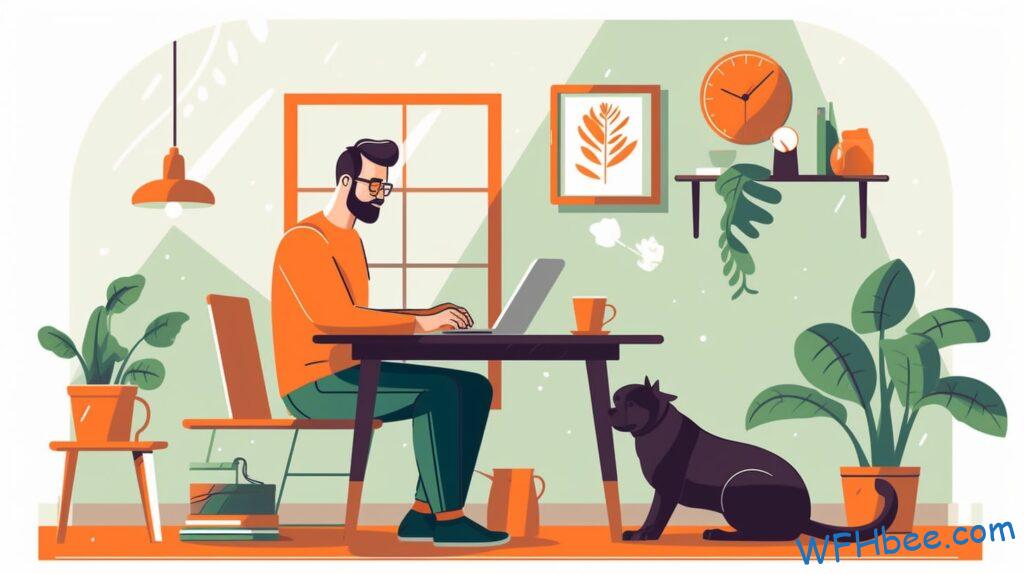Are you an introvert who has been asked to work from home? You may be wondering if it’s a good fit for your personality type. Working remotely can provide many benefits, but there are some challenges that come with it too. This article will discuss the pros and cons of working from home as they relate specifically to introverts.
The idea of staying connected while avoiding crowded places and small talk may seem like a dream come true for introverts. It’s no surprise that remote work is becoming increasingly popular in today’s digital age – but does this trend truly benefit those who prefer solitary environments?
This article will explore the positives and negatives of working from home as experienced by introverts. We’ll look at how to make the most out of this situation so that you can find success without compromising on your own personal needs and preferences. Read on to discover whether working from home could be right for you!

Definition Of An Introvert
According to a 2017 study, almost 50% of the American population are introverts. Defined as individuals who prefer to spend time alone and gain energy from solitude, an introvert personality is characterized by qualities such as being independent, thoughtful, reserved, reflective and sometimes shy. Introverted traits include being more focused on inner thoughts than external stimuli; needing time-outs for recharging after social interactions; enjoying self-directed activities over group events; and often feeling anxious in unfamiliar or chaotic situations.
When it comes to the definition of an introvert, it’s important to note that many people possess some combination of both extroverted and introverted characteristics. Furthermore, research suggests that all humans have varying levels of conditioned responses regarding their ability to interact with others – regardless of whether they’re categorized as an extrovert or an introvert. As such, there’s no single set of “introvert qualities” or one-size-fits-all definition for this type of personality.
This begs the question: Is working from home good for introverts? To answer this query thoroughly, we must explore both the advantages and disadvantages associated with remote work environments.

Advantages And Disadvantages Of Working From Home
Given the definition of an introvert, it is safe to assume that many find working from home appealing. Working remotely can provide a great deal of advantages for people who prefer a more solitary work environment and enjoy having control over their own schedule. However, there are also some potential drawbacks which should be addressed.
One advantage of working from home for introverts is being able to create an ideal workplace atmosphere without external distractions or interruptions. Having complete freedom over one’s workspace allows them to customize it so they feel most comfortable while they are at work. This flexibility can be especially helpful in fostering mental health and productivity on days when motivation may be lacking due to social anxiety or limited energy levels.
In addition, remote workers have the opportunity to save time and money that would otherwise have been spent commuting back-and-forth between home and office each day. While this offers convenience, it can be quite difficult for those with limited self-discipline as maintaining focus during long hours alone requires strong internal motivation and structure. Furthermore, digital communication can make collaboration more challenging due to lack of face-to-face meetings where ideas could easily be exchanged.
Though working from home provides many benefits for introverts, there are still some challenges associated with this lifestyle that should not go overlooked. With careful consideration of these pros and cons, introverted individuals will likely find themselves well prepared to take up the new challenge of working from home successfully. Moving forward into the subsequent section about ‘challenges for introverts in working from home’, we must look closer at how adapting to this new way of life impacts those living with social anxieties and other complexities related to being an introvert in a predominantly extroverted society.

Challenges For Introverts In Working From Home
As an introvert, working from home can have its challenges. It’s important to be aware of these issues and take steps to ensure that you remain productive while in your home office. One of the biggest challenges for introverts is stress. Working from home often means feeling isolated, which can lead to increased levels of stress and anxiety. Additionally, it can be difficult for introverts to stay motivated when there is no one else around providing motivation or guidance.
Another challenge is productivity. As an introvert, it may be hard to focus on work-related tasks without distractions such as social media and other people’s conversations nearby. To combat this issue, try setting up a designated workspace in a different room than where you normally spend most of your time at home so that you don’t get sidetracked by everyday life. Also, create a structured schedule with clearly defined goals each day so that you know what needs to get done and how long it should take you to complete those tasks.
Finally, it is important for introverts who are working from home to find ways to foster meaningful connections with colleagues even if they aren’t physically present. This could include setting aside regular times for virtual meetings or having phone calls instead of emails whenever possible so that everyone has the opportunity to talk about their progress or discuss any obstacles they might encounter along the way. Making sure these kinds of interactions occur regularly will help reduce feelings of isolation and provide much needed support during this challenging period in our lives. With the right mindset and strategies in place, we can successfully overcome the potential pitfalls that come with being an introvert working from home and make sure our productivity remains strong throughout it all. Transitioning into how to overcome isolation when working from home then becomes easier since we’ve already taken proactive measures towards addressing common problems associated with it.

How To Overcome Isolation When Working From Home
The challenges of working from home for introverts can be daunting as they are often more predisposed to isolation than their extroverted counterparts. While it is true that the relative autonomy offered by working remotely may at first appear like a dream come true, in reality, this lack of structure and social contact can quickly lead to feelings of loneliness and depression. Fortunately, there are several strategies which can help an introvert overcome the isolation associated with working from home:
- Set Structured Working Hours: Setting regular work hours helps create a sense of normalcy and routine that would otherwise be missing if you were simply “winging” your day-to-day tasks.
- Make Time for Social Interaction: Whether it’s through online chat rooms or virtual meetings with colleagues, making time for some real human interaction each day will help keep your morale up.
- Get Outdoors Regularly: Spending time outdoors has been shown to reduce stress levels and boost moods – not to mention it provides much needed vitamin D! Taking regular breaks throughout the day to go outside (even if just a brief walk around the block) can make all the difference when trying to stay motivated while working from home.
These simple steps will go a long way toward helping an introvert manage their own mental health while avoiding feeling lost in the shuffle of remote work culture. With consistency and dedication, overcoming any initial isolation associated with transitioning into a work-from-home lifestyle is certainly achievable regardless of personality type. The next section looks further into WFH tips for managing stress levels as an introvert who works remotely.

Tips For Managing Stress Levels As An Introvert
Stress management is an important part of living a healthy and balanced life, especially for introverts. It can be difficult to manage stress levels when working from home as an introvert because it is often more isolating than working in an office environment. However, there are some tips that introverts can use to help them manage their stress levels while working from home.
First, it’s important for introverts to create a space where they feel comfortable and relaxed. This could include making sure the room has plenty of natural light or having objects that bring comfort such as plants or calming scents nearby. Taking breaks throughout the day is also beneficial for managing stress levels as an introvert. Breaks should involve activities like taking walks outside, practicing mindfulness exercises, listening to music, or doing something creative.
In addition, being intentional about scheduling social interactions with friends and family members can also help reduce feelings of loneliness and isolation which often lead to higher stress levels in people who are naturally more introverted. Setting up virtual coffee dates or game nights over video chat can provide much needed connection during this time away from others physically.
With these tips in mind, adjusting to working from home as an introvert doesn’t have to be so overwhelming after all. To further improve concentration and focus at home, establishing daily routines and boundaries around work hours may be necessary.

Strategies For Improving Concentration And Focus At Home
Working from home can be a great boon for introverts, as they often prefer quiet and solitude to focus on tasks. But working from home also presents its own challenges: how do you maintain concentration in the face of distractions? The good news is that there are several strategies for improving concentration and staying focused while working at home.
The first strategy is to create a dedicated workspace with minimal distractions. For instance, invest in noise-cancelling headphones or designate an area away from family members who may cause interruptions during work hours. Additionally, make sure your equipment is up to date so that technology doesn’t become a source of frustration during your work day.
Second, establish clear boundaries between your personal life and professional life by setting specific office hours when you will log onto your computer each day. This structure helps keep yourself accountable and encourages productivity because it provides consistency throughout the week. Furthermore, plan out daily goals ahead of time that have concrete deadlines so you stay motivated while working at home.
Finally, take regular breaks throughout the day since studies suggest too much sitting can reduce productivity levels over time. Taking short walks around your neighborhood or doing some stretches can help reenergize parts of the brain responsible for memory formation and decision making which leads to improved focus overall. With these strategies in mind, maintaining motivation and concentration while working from home should become easier overtime. Transitioning into this new way of living then opens us up to explore other mental health benefits associated with remote work such as increased creativity or better sleep quality.

Mental Health Benefits Of Working From Home
John, an introvert working from home for the past year, has experienced a great deal of positive mental health benefits. Working remotely allowed John to avoid office distractions and instead focus on his tasks. He also felt supported by being able to communicate with colleagues through remote technologies such as Zoom or Slack that enabled him to stay connected without having to be physically present in the office environment. Here are four main mental health benefits associated with working from home:
- No Introvert Isolation – Working from home provides opportunities to connect with co-workers while avoiding the overwhelming feeling of being around large groups of people.
- Reduced Stress Levels – Being able to work away from the hustle and bustle of an office can help reduce stress levels significantly for introverts who may find social interactions draining at times.
- Better Communication Skills – Remote communication tools provide a platform where introverts can feel more comfortable expressing their ideas, opinions and suggestions than they would in person when surrounded by extroverted coworkers.
- Increased Productivity – The lack of physical presence in the workplace often allows introverts time and space needed to think clearly and perform at their best level, resulting in increased productivity for them personally and for the company overall.
These mental health benefits demonstrate why it is beneficial for both individual workers as well as companies when allowing employees to work remotely, particularly if they are introverts who need extra support due to their personality type. As this example illustrates, working from home offers many advantages that should not be ignored when considering how best to optimise your workspace.

How To Optimise Your Workspace
Having established the mental health benefits of working from home, it’s now time to look at how best to optimise your workspace. To make sure you’re able to get the most out of every day, having an ergonomic and organised space is key.
Start by assessing what kind of environment you need in order to be productive. Do you prefer a lot of natural light? Are there certain items or decoration that help inspire creativity? Once you’ve identified what works for you, start organising your workspace into neat sections: collaboration area, desk area, storage area etc. Also consider if any additional furniture or technology might benefit your productivity – such as a standing desk or dual monitors.
Finally, don’t forget about personal touches like plants or artwork which can help break up the monotony and add some personality to your workspace. Making these small changes will not only improve efficiency but also provide comfort and structure needed when working from home.
The next section looks at creative ways to interact with colleagues remotely – something equally important for maintaining strong professional relationships regardless of location!

Creative Ways To Interact With Colleagues Remotely
It’s no surprise that remote work has seen an immense surge in the past few years. According to a 2019 survey from Global Workplace Analytics, at least 42% of workers worked remotely for at least part of their working week. Remote teams can be tricky to manage and maintain positive relationships with colleagues, but there are many creative ways to stay connected.
One way is through virtual team building activities like online group games or video conferencing tips. They help create more meaningful connections between people who don’t work in close proximity. Online games also encourage friendly competition which helps foster collaboration amongst teammates. There are plenty of websites dedicated specifically to helping remote teams brainstorm ideas on how they can interact virtually while still creating genuine bonds with one another.
Additionally, it’s important to have open communication regarding expectations when working remotely so everyone is kept accountable and knows what’s expected of them as well as their peers. Establishing clear guidelines will benefit everyone by providing clarity on roles, tasks and deadlines while fostering trust amongst the team too! With strong communication strategies in place, remote teams should strive to keep morale high even when not physically together by setting aside time for catch-ups or coffee dates over Zoom or other similar platforms during regular intervals throughout the year.
By implementing these practices into our everyday routines, we’ll be able to facilitate better connection and understanding between colleagues – ensuring that each person feels valued and respected regardless if they’re sitting next to you or miles away! Now let’s take a look at why self care is essential when working from home.

Why Self Care Is Essential When Working From Home
With the rise of remote work, it has become increasingly important for all types of people to practice self-care when working from home. Self-care can be especially beneficial for introverts who prefer solitude and less social interaction than their extroverted counterparts. In order to stay productive while working remotely, introverts need to make sure they prioritize their mental health and well-being by implementing a daily routine that includes healthy habits such as exercise, meditation, journaling or leisure activities.
Self-care is essential in preventing burnout during long periods of remote work. Introverts should take breaks throughout the day so they have time to recharge and reset before tackling any difficult tasks. This could include taking a walk outside, listening to music or reading a book. These small moments away from work can help clear your mind and boost creativity when you return to work later on.
Creating a comfortable workspace is also an important aspect of self-care for those who are working from home. Making sure your environment is free from distractions will allow you to focus better on the task at hand and give yourself space and privacy if needed. Setting boundaries between work life and personal life is also key in achieving balance when adjusting to this new way of living and working.
Taking steps towards prioritizing mental health can ultimately lead to increased productivity when working from home, especially for introverts. To feel more energized and creative while working remotely, it’s important to establish healthy routines that incorporate physical activity, relaxation techniques and mindful behavior into our daily lives. With these strategies in place, we’ll be able to perform optimally without sacrificing our mental wellbeing in the process. By understanding how best to leverage our individual strengths through self care practices, we can equip ourselves with the tools necessary to increase productivity as an introvert – no matter where we’re located or what type of job we do!

How To Increase Productivity As An Introvert
Working from home can be like learning a new instrument – it requires practice and dedication to master. But for introverts, it is an even bigger challenge, as they need solitude to concentrate on tasks and feel recharged. Here are some ways introverts can increase their productivity while working from home:
- Optimise your workspace:
- Create a comfortable space where you can work without distractions or noise.
- Make sure the room is well lit and equipped with any tools you may need (e.g., laptop, printer).
- Increase focus:
- Schedule regular breaks throughout the day so you don’t burn out.
- Try meditation or mindfulness exercises to help stay focused when tackling difficult tasks.
- Don’t multitask – do one task at a time to ensure quality work.
By having these tips in mind, introverts will find themselves better able to manage their workloads and get things done more efficiently – allowing them to make the most of working from home. With such optimised conditions in place, we now turn our attention towards the importance of setting boundaries when working from home.

The Importance Of Setting Boundaries When WFH
Although working from home can be a great benefit to introverts, it’s important to set boundaries. Working from home requires discipline and organization in order to stay focused and productive. By setting clear boundaries between work-time and leisure-time, an introvert can better manage their daily tasks without becoming overwhelmed by the stress of their job.
The importance of establishing boundaries while working from home cannot be overstated. Boundaries are essential for managing time efficiently so that both your professional responsibilities and personal life remain balanced. Establishing these limits also ensures that you have enough energy throughout the day to complete all necessary tasks. It’s important to recognize when you need a break or some downtime; taking regular breaks helps maintain focus and productivity as well as preventing burnout.
It is vital for introverts who work from home to understand how important it is to create a workspace free of distractions – this includes turning off notifications on phones, tablets or laptops during certain hours so that focus remains undisturbed. Additionally, having designated times for specific projects gives structure to your workflow and allows you to fully concentrate on each task before moving onto the next one. Setting realistic goals will help keep your motivation levels high while also providing tangible results that demonstrate progress towards achieving them.
With appropriate boundaries in place, introverts can get more out of working remotely as they enjoy less distraction and fewer interruptions than traditional office settings provide. Knowing how to properly organize their day-to-day activities with effective boundary management is key for any introverted remote worker looking for success in their profession. Taking the time to establish guidelines for yourself greatly increases the chances of succeeding at any endeavor undertaken. With thoughtful consideration given towards fostering healthy habits, remote workers can use their skillset most effectively and continue making meaningful contributions even outside of an office environment. Moving forward, techniques such as creating opportunities for virtual team building exercises may prove beneficial in improving communication when working remotely.

How To Improve Communication When Working Remotely
Working from home can be a dream come true for many introverts, but communication is essential to make it work. Fortunately, there are numerous remote communication techniques that can help create an effective and successful working environment. From adopting the right technology to developing strategies for communicating with colleagues, here are some of the most important tips for improving remote communication in any workplace setting.
First, adopt the right technology for your team’s needs. This means finding tools and software that allows everyone to share information quickly and easily without compromising security or privacy protocols. For example, video conferencing platforms like Skype and Zoom allow teams to stay connected while keeping all communications secure. Additionally, they provide opportunities for quick collaboration sessions as well as more formal meetings when necessary.
Second, set clear expectations about how often you’ll expect people to check-in or follow up on tasks and projects. Establishing these guidelines upfront ensures everyone knows what’s expected of them and helps avoid confusion down the line. Similarly, try to schedule regular check-ins so that everyone stays informed on progress updates or changes in direction or strategy. These conversations don’t have to take long but should be designed specifically to keep everyone apprised of developments within their particular area of expertise.
Finally, actively listen when speaking with others remotely and strive for clarity when conveying messages both verbally and written over digital channels. Pay attention not just to words used but also body language which might need extra emphasis through audio cues such as tone of voice or inflection. In this way, even if individuals aren’t physically together they can still express empathy towards each other which will foster better understanding between parties involved in virtual exchanges making remote working much smoother overall. With these tips in mind, employees can feel confident knowing they have the skills needed to effectively communicate no matter where they’re located!

The Benefits Of Taking Breaks When Working At Home
Working from home offers many advantages to introverts, but it can also be overwhelming. Taking regular breaks is an essential part of maintaining mental well-being while working remotely. Breaks provide a chance for introverts to step away from their work environment and recharge their energy levels. By taking regular breaks at home, introverts can refresh themselves and return to the task with renewed focus and enthusiasm.
Short breaks allow introverts to take a few minutes to stretch or go for a quick walk outdoors. This helps them break away from the monotony of work and relax their mind and body. Longer breaks help reduce stress by providing time for restful activities such as reading a book, doing yoga, or listening to music. Regular breaks are also important for resetting one’s productivity level; this allows introverts to remain productive throughout the day without feeling exhausted or overwhelmed.
While these short-term benefits of taking regular breaks when working from home are significant, there may be potential long-term effects on mental health that should not be overlooked. Therefore, it is important for introverts who are working remotely to make sure they are taking sufficient time out throughout the day in order to stay healthy both physically and mentally in the long run.

Potential Long-Term Effects On Mental Health
Working from home can be a great option for introverts, but it’s important to consider the potential long-term effects on mental health. While working remotely may have some immediate mental health benefits such as improved focus and reduced stress, there are still concerns about its implications in the long run.
The lack of physical interaction with co-workers or peers could lead to feelings of isolation over time which could cause serious mental health impacts or repercussions. In addition, without an adequate support system, this feeling of loneliness could become more severe resulting in deeper emotional issues such as depression or anxiety. Furthermore, having limited access to formal work resources might also have lasting consequences that affect both productivity and overall job satisfaction.
It is therefore essential to recognize the possible psychological risks associated with working from home before making any decisions regarding remote employment. It is important to create healthy coping mechanisms and find ways to stay connected and engaged with colleagues even when working outside traditional office settings. Taking these steps will help ensure positive mental health outcomes throughout the course of remote employment.

Final Summary
In conclusion, working from home can be beneficial for introverts in many ways. They benefit from having more control over their environment and being able to take regular breaks throughout the day. Working remotely also allows them to set boundaries that help manage stress levels and improve communication with colleagues. However, it’s important to be mindful of potential isolation, which could lead to long-term mental health issues if not managed properly.
One interesting statistic is that up to 40 percent of people who work from home feel isolated when doing so. This means it’s essential for introverts to stay connected by maintaining meaningful relationships both inside and outside the workplace. I recommend investing time into building a supportive network of friends or family members you trust, as well as incorporating self-care activities such as yoga or meditation into your daily routine.
Overall, working from home has its pros and cons for introverts but should definitely not be overlooked as an option for anyone looking for flexible employment opportunities. With some careful planning and implementing good habits like setting boundaries, taking regular breaks and staying socially connected, remote workers can enjoy a healthy balance between productivity and personal wellbeing.
Author: Robin Borg
Hi, I’m Robin. I have been working from home at least one day a week during all of my adult life. I have a background in research and data science. Get to know me better in the About page.







